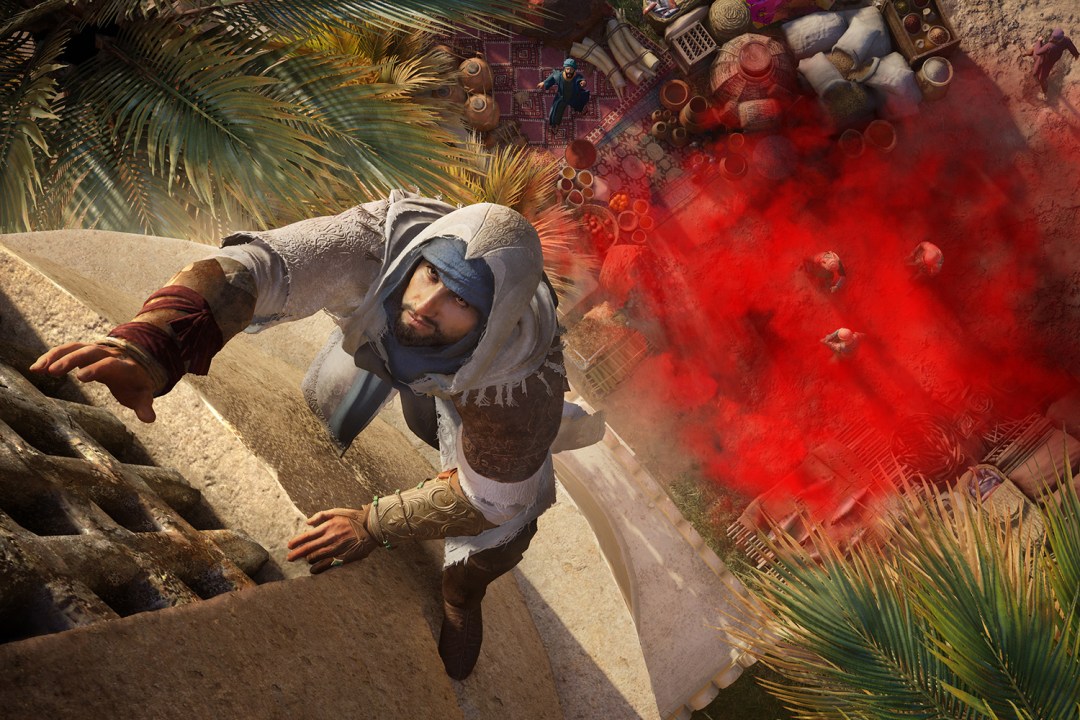Assassin’s Creed Mirage review: smaller, still mighty
One of Ubisoft’s most beloved series goes back to its stealthy roots

Stuff Verdict
Enjoyable stealth action returns in an Assassin’s Creed game you might actually finish
Pros
- Assassinations once again the main draw
- Fun tools to unlock
- Baghdad is a classic Assassin’s Creed setting
- Lots of nods to the past for hardcore fans
Cons
- Melee combat isn’t the best
- Too much grassing from the locals
- Occasional glitches and performance issues
Introduction
What actually is an Assassin’s Creed game in 2023? When Ubisoft’s series debuted the emphasis was on sneaking around and emerging from the shadows to shank Very Bad People in the neck. Traversal played a big part too, with original protagonist Altair being pretty good at parkour. Every now and again you’d be pulled into the modern day to wander around a lab as not particularly interesting chap Desmond Miles, but we won’t get into all that here. It was a great blueprint for the brilliant sequel to build on.
As the series has grown in scale, so too have its virtual worlds. Dense city settings were replaced with entire countries, and the focused stealth-action gave way to sprawling open-world RPGs that gradually became less interested in the whole assassin thing. 2020’s Assassin’s Creed Valhalla had you play as a Viking – not typically people known for their subtlety. They all tie together in a famously convoluted timeline, sure, but you could make a solid case for the series becoming a little bit too bloated for its own good.
That’s where Assassin’s Creed Mirage comes in. Originally intended as DLC for the aforementioned Valhalla, this is a tighter, much leaner and decidedly less intimidating Creed, and one that marks a confident return to the series’ stealthy roots. If you’re nostalgic for the Assassin’s Creed of old then you’ve come to the right place. But is Mirage more than a throwback with shinier visuals?
Back to basics

Mirage is such a homage to the original Assassin’s Creed you can even select a visual filter that replicates its distinctive colour palette. 9th century Baghdad, where most of the campaign takes place, is the ideal setting for a game trying to recapture the OG game’s vibe, with its stately palaces, crowded markets, mazy back streets and, of course, abundance of conveniently placed hay bales.
Street thief protagonist Basim Ibn Ishaq is quickly drawn to a greater cause than picking pockets. Recruited by the Hidden Ones, an ancient organisation that would later become the Assassins, he’s taken to their mountain hideout to begin his training. Basim also features prominently in Assassin’s Creed Valhalla, but Mirage is mostly a self-contained prequel to that game, so you don’t need to have played it to enjoy the story here.
It soon becomes pretty clear that something else is going on with our hero, something so disturbing that it’s amazing he can concentrate on the task at hand, but you’ll need to push through quite a bit of the narrative before you find out what it all means.
Structurally, the game is very Assassin’s Creed, albeit with more meat on the bone and variety in how you go about ticking off your objectives. After a fairly slow start Basim returns to Baghdad, where he’s tasked with investigating and ultimately eliminating members of The Order of the Ancients, a religious collective that secretly rules over the city and its surrounding areas. Before getting to the main targets – which you’re free to tackle in any order before the climactic missions – you’ll need to find out who they are and where to find them by spying on those in their inner circle. Your investigation board quickly turns into a spider’s web of dodgy dealings and political puppetry, and you’re always given good reason to want these people gone.
We enjoyed some of the more bite-sized objectives, which might have you tailing an informant from the rooftops, questioning witnesses or rescuing rebel prisoners from a farmhouse away from the commotion of the city, but the main assassinations are where the game is at its best. You’ll infiltrate prisons, heavily guarded Garrisons and bustling bazaars to hunt down your targets, and it’s rarely as simple as just sneaking in through the back.
One Order member, a corrupt soap merchant, had to be tempted out of his safehouse, which involved us calling in a favour from someone whose confiscated goods we’d recovered. Being granted an audience with another target required us to steal a brooch so we’d be considered worthy of their company. You can eavesdrop on gossipers for tip-offs, smuggle yourself past checkpoints by blending with crowds, or pay mercenaries to disturb the peace so you can walk through unnoticed.
Sneaky does it


Stealth games have come a long way since the original Assassin’s Creed, with the likes of the Dishonored series, The Hitman trilogy and Metal Gear Solid V: The Phantom Pain setting a new gold standard for player freedom and creativity. It’s probably a bit unfair to compare Mirage with these genre classics, especially as the first full game from Ubisoft’s Bordeaux studio, but we couldn’t help it; during the opening hours, Basim can’t do more than whistle from the bushes to lure unsuspecting guards. The AI is a bit hit and miss too, with guards quick to react to noises but often strangely unmoved by seeing a pile of their inanimate pals on the ground.
Things pick up pretty quickly, as Basim unlocks tools such as throwing knives, stun mines, smoke bombs and our, personal favourite – blowdarts that can send guards to sleep on impact. Once you have them all at your disposal the game becomes a lot more fun. Breaking guards out of their patrol patterns allows you to quickly take out multiple targets with chained assassinations, or you can distract them with a noise and bypass them altogether. Basim can also slow down time and select a number or targets to quickly assassinate before they can raise the alarm.
Like in previous entries, you also have both Eagle Vision and an eagle companion called Enkidu that can be used to scope out areas. These highlight enemies, treasures and areas of interest to give you an advantage. When it’s firing on all cylinders and you’re making full use of your arsenal, Assassin’s Creed Mirage can make you feel like a bit of a medieval Batman.
Sometimes it feels a little too easy to get spotted, though. On the default difficulty setting there are guards everywhere, all the time, and if your notoriety meter is high civilians will regularly alert the authorities. Which seems a bit ungrateful. Constantly being exposed makes it hard to get on with your important investigative work in peace, and while it’s possible to decrease your wanted level by paying off street preachers or tearing down wanted posters, we spent a bit too much time trying to lose pursuers. While there’s an autosave feature, you can’t save during missions, so if you’re the kind of person who likes to remain a ghost in stealth games, you’ll likely wish it was easier to retry sections from a specific point.
No fighter


While this is primarily a stealth action game – and one that rewards you for playing it that way – you’ll be drawn into combat quite often. Either because the story dictates it, or because you suddenly find yourself surrounded by a lot of angry guards with spear tips pointed at your head. This is where Assassin’s Creed Mirage is at its weakest.
There’s a solid enough combat system underpinning everything, with a very generous parry manoeuvre allowing you to dispose of enemies pretty swiftly if you’re patient. Some attacks are unblockable and need to be dodged, but when this happens the enemy will be covered in a red outline, making them easy to anticipate. Like in previous Creed games, well-timed attacks lead to some satisfyingly gory finishing moves, while your swords and daggers have different abilities, like poison or the power to slow time for a few seconds after a successful parry.
The issue is that melee combat never really evolves from its pretty basic foundations, and always just felt a little bit off to us, especially when you’re trying to fight 360-degrees and the system isn’t responsive enough to let you fend off attacks from every direction. The fact that your skill tree only features a few melee-related abilities suggests that Ubisoft didn’t consider it to be a major part of its game.
Again, Basim himself makes it very clear that he prefers to operate from the shadows, so it’s at least consistent with his character that the fighting isn’t as fun as the sneaking, but Assassin’s Creed Valhalla definitely had meatier brawls.
Need for Creed


Assassin’s Creed Mirage is a shorter, more narrative-driven affair than its recent predecessors, but that’s not to say it’s a small game. You’re not going to get one of those from Ubisoft in 2023. While most of the important stuff happens in Baghdad, there are other places on the map, like Basim’s home of Anbar and Jarjaraya to the south. There’s also a fully explorable “Wilderness” that surrounds the city, which should appease fans who enjoyed the vast landscapes of Assassin’s Creed Odyssey and Origins. It’s not the entirety of Egypt, granted, but Mirage’s map has plenty of variety, not to mention some lovely sunsets if you venture into the countryside.
The map screen is nothing like as swarming with icons as the recent games, but it’s far from bare. You still have plenty of towers to leap from, artefacts to steal, weapon and outfit upgrades to unlock, and treasures to hunt. There’s a whole side quest involving ancient writings that we didn’t even get to. You’ll be able to unlock the majority of the skill tree before the credits roll. You can take on additional contracts too, which range from escort missions to thief gigs and more assassinations.
Mirage is undoubtedly a more modest endeavour than Valhalla. You can polish off the main story in around 20 hours, and add another 10 if you want to see everything the game has to offer. We spent around 30 hours in the previous game’s England and tapped out before seeing what Winchester looked like during the Viking age. That’s not to say there isn’t a place for chunkier Assassin’s Creed entries in the future (and you’d better believe they’re coming), but in this year of massive games, Mirage is a refreshing detour.
Assassin’s Creed Mirage verdict
Assassin’s Creed Mirage is an Assassin’s Creed game for people who miss the original, but it would be reductive to dismiss it as nostalgia-bait alone. The team at Ubisoft Bordeaux have taken the best bits of the first few games and built on them, and Baghdad is a great parkour playground to get stabby in.
There’s nothing remotely groundbreaking about the latest series entry, and there are times when some of its platforming and combat sequences can feel a bit too mid-2000s. Still, we had a good time getting to know the Hidden Ones. Wherever the series goes from here, it will do well to remember where it came from, as Mirage does with style.
Stuff Says…
Enjoyable stealth action returns in an Assassin’s Creed game you might actually finish
Pros
Assassinations once again the main draw
Fun tools to unlock
Baghdad is a classic Assassin’s Creed setting
Lots of nods to the past for hardcore fans
Cons
Melee combat isn’t the best
Too much grassing from the locals
Occasional glitches and performance issues
